Spanish town bans Muslim festivals in public spaces

A recent decision by the local council in Jumilla, located in Spain’s Murcia region, has triggered widespread backlash. The council banned Muslim religious celebrations like Eid al-Fitr and Eid al-Adha from public venues such as community centers and sports halls.
The council’s justification rests on preserving the town’s “identity.” The new rule states that venues can only be used for religious or cultural activities organized by the local authority. Although the rule doesn’t mention Islam directly, it clearly affects only Muslim festivals.
Political Support and Constitutional Concerns
The People’s Party (PP) proposed the motion. It passed with the abstention of Vox, a far-right political group. Left-wing parties opposed the move, calling it discriminatory.
Legal experts believe the decision violates Article 16 of Spain’s Constitution, which guarantees freedom of religion. They point out that religious expression can only be limited if it threatens public order. In this case, no such threat exists.
“This is not just a legal issue—it’s about equality,” said one constitutional lawyer during a news interview. “Targeting one community under vague terms like ‘identity’ is not acceptable.”
Muslims in Jumilla Feel Targeted
The Muslim community in Jumilla feels isolated and disrespected. For decades, local Muslims have used public venues to celebrate Eid with families, friends, and neighbors. These gatherings fostered a sense of unity and inclusion.
Mohamed Ajana, president of the Spanish Federation of Islamic Organisations, voiced his concern. “For the first time in 30 years, I feel afraid. We are being pushed aside.”
He isn’t alone. Many Muslims across Spain fear the policy could inspire similar bans in other towns. The atmosphere of exclusion is growing, even among second-generation Muslims who were born and raised in Spain.
Criticism From All Corners
Not everyone in Jumilla supports the ruling. Former mayor Juana Guardiola questioned what the council meant by “identity.” She emphasized Spain’s rich Islamic history. “What about the centuries of Muslim legacy here?” she asked. “Our architecture, language, and customs reflect it.”
The town’s decision, she argued, erases part of Spain’s cultural DNA. Others agree. Spain was home to the Islamic kingdom of Al-Andalus for nearly 800 years. Its influence remains visible in Spanish society today.
Rights Groups Join the Fight
Amnesty International Spain has also condemned the decision. In a public statement, the group described the rule as “discriminatory in effect, even if not in name.” They called on authorities to ensure equal access to public spaces for all citizens.
Francisco Lucas, a Socialist Party leader in Murcia, accused the council of violating constitutional principles. “Institutions should bring people together, not divide them,” he said.
What’s Next?
Lawyers are now preparing to challenge the ban in Spain’s Constitutional Court. Advocacy groups are also asking the national government to step in. They believe this decision could violate both domestic law and international human rights agreements.
In the meantime, the Muslim community is uncertain. Eid al-Adha is approaching, and they’re unsure where to hold celebrations. Some are considering traveling to nearby cities. Others may move festivities to private homes.
Fatima H., a resident of Jumilla for over ten years, shared her concerns. “I came here believing in Spain’s values of freedom and dignity. This decision makes me question that belief.”
More Than a Local Issue
Jumilla’s ruling isn’t just a local story. It reflects broader tensions across Europe over religion, identity, and belonging. As populist and far-right voices gain traction, religious minorities face growing pressure.
The ban has forced Spain to look inward. What does it mean to be inclusive in a country with such a diverse heritage? How should modern societies balance tradition with religious freedom?
Final Thoughts
The move by Jumilla’s council has sparked a deep national debate. It challenges Spain’s commitment to equality and religious rights. Whether the courts overturn the ruling or not, the damage to trust and community spirit is already done.
This story reminds us that democracy must be guarded—not just by law, but by our daily choices as citizens and leaders.






